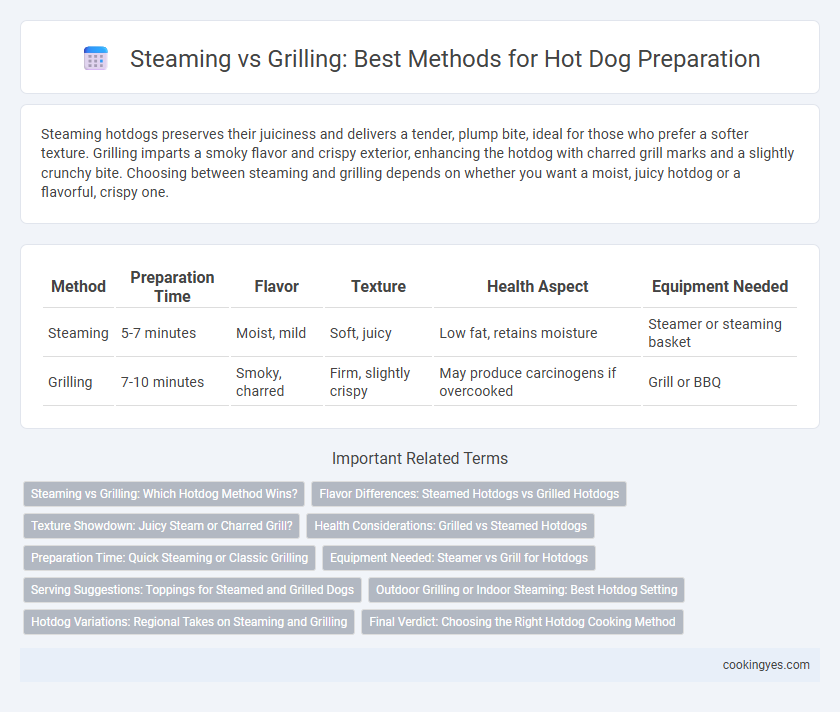Steaming hotdogs preserves their juiciness and delivers a tender, plump bite, ideal for those who prefer a softer texture. Grilling imparts a smoky flavor and crispy exterior, enhancing the hotdog with charred grill marks and a slightly crunchy bite. Choosing between steaming and grilling depends on whether you want a moist, juicy hotdog or a flavorful, crispy one.
Table of Comparison
| Method | Preparation Time | Flavor | Texture | Health Aspect | Equipment Needed |
|---|---|---|---|---|---|
| Steaming | 5-7 minutes | Moist, mild | Soft, juicy | Low fat, retains moisture | Steamer or steaming basket |
| Grilling | 7-10 minutes | Smoky, charred | Firm, slightly crispy | May produce carcinogens if overcooked | Grill or BBQ |
Steaming vs Grilling: Which Hotdog Method Wins?
Steaming hotdogs locks in moisture, resulting in a juicier and softer texture that enhances the natural flavors. Grilling imparts a smoky, charred taste and crispy exterior, appealing to those who prefer a more robust flavor profile. Choosing between steaming and grilling depends on whether you prioritize tenderness and juiciness or a smoky, textured bite.
Flavor Differences: Steamed Hotdogs vs Grilled Hotdogs
Steamed hotdogs retain a juicy, tender texture with subtle flavor nuances that enhance the natural taste of the sausage. Grilled hotdogs develop a smoky, charred exterior that intensifies the flavor profile and adds a satisfying crunch. The Maillard reaction during grilling creates complex savory notes absent in steaming, making grilled hotdogs more robust in taste.
Texture Showdown: Juicy Steam or Charred Grill?
Steaming hotdogs locks in moisture, creating a juicy and tender bite that enhances the natural flavors of the meat. Grilling imparts a smoky char with crispy edges and a slightly caramelized crust, offering a bold texture contrast. Each method showcases a distinct texture--steaming delivers softness while grilling provides a satisfying crunch and robust flavor.
Health Considerations: Grilled vs Steamed Hotdogs
Grilling hotdogs can create potentially harmful compounds like heterocyclic amines (HCAs) and polycyclic aromatic hydrocarbons (PAHs) due to high heat and direct flame exposure, which are linked to increased cancer risk. Steaming hotdogs avoids charring and reduces the formation of these toxic substances, making it a healthier cooking method. However, choosing lower-fat hotdog varieties and controlling portion size are important regardless of the cooking technique to minimize health risks.
Preparation Time: Quick Steaming or Classic Grilling
Steaming hotdogs offers a faster preparation time, typically requiring just a few minutes to achieve a juicy, tender texture. Grilling hotdogs takes longer but imparts a smoky flavor and crispy exterior that many enthusiasts prefer. For quick meals, steaming is ideal, while grilling suits those prioritizing taste and texture depth.
Equipment Needed: Steamer vs Grill for Hotdogs
Steaming hotdogs requires a simple steamer basket or an electric food steamer that maintains consistent moist heat, preserving juiciness without charring. Grilling demands a barbecue grill or a smoker, often with adjustable heat controls and a grate to achieve those signature grill marks and smoky flavor. Each method's equipment significantly influences texture and taste, making the choice critical for culinary outcomes.
Serving Suggestions: Toppings for Steamed and Grilled Dogs
Steamed hotdogs retain a juicy texture that pairs well with classic toppings such as mustard, ketchup, relish, and sauerkraut to enhance their mild flavor. Grilled hotdogs develop a smoky char that complements bolder toppings like caramelized onions, jalapenos, BBQ sauce, and melted cheese, intensifying the eating experience. Both methods serve as excellent bases for creative combinations, but topping choices should highlight the distinct preparation techniques.
Outdoor Grilling or Indoor Steaming: Best Hotdog Setting
Outdoor grilling imparts a smoky, charred flavor and crispy texture to hotdogs, making it ideal for backyard barbecues and picnics. Indoor steaming preserves the hotdog's juiciness and tenderness while being a quicker, mess-free method perfect for kitchen preparation. Choosing between grilling and steaming depends on whether you prioritize bold, grilled aroma or soft, moist bites in your hotdog experience.
Hotdog Variations: Regional Takes on Steaming and Grilling
Steaming hotdogs is popular in New England, where the method maintains a juicy texture ideal for the classic frankfurter, often served with simple mustard and onions. In contrast, grilling reigns supreme in Chicago, imparting a smoky char and crisp snap essential to the iconic Chicago-style hotdog loaded with pickles, tomatoes, and sport peppers. Both techniques highlight regional preferences that influence hotdog toppings and bun styles, shaping unique local flavor profiles.
Final Verdict: Choosing the Right Hotdog Cooking Method
Steaming hotdogs preserves juiciness and tenderness by evenly heating without charring, ideal for a softer bite. Grilling imparts smoky flavor and appealing grill marks, enhancing texture and taste with a slightly crispy exterior. Choose steaming for moist, mild hotdogs or grilling for robust, flavorful bites that complement outdoor cookouts.
Steaming vs Grilling for hotdog preparation Infographic

 cookingyes.com
cookingyes.com